CHAPTER 1
Introduction
Reading comprehension is a significant part of daily life. The ability to read and understand through communication empowers to make life decisions. Therefore, reading comprehension is the ability to process information that we have read and to understand its meaning. Readers 3 comprehend a text when they can communicate with it.
Reading comprehension provides what is being read more significance. It makes reading more enjoyable, interesting, and educational when the words on a page are more than just words; they are concepts and ideas. This helps people flourish in life in general as well as in school and the workplace. Students must be able to interpret what they read, relate what they read to what they already know, and think critically on what they have read to comprehend written information successfully. A thorough analysis of a topic or event is necessary to understand any problem. Comprehension is the process of understanding what is read or heard.
There are four aspects of reading comprehension which the students should comprehend a text well, such as determining the main idea, finding specific information (scanning), making inference, and understanding the meaning of words or detail information which are considered as student difficulties in understanding the text. These aspects are regarded as difficulties that the students encounter in comprehending the text. (Nuttall 2018)
According to the results of Program for International Student Assessment (PISA) on Dec 3, 2019, the Philippines scored the lowest in reading comprehension. Students' challenges with reading and comprehension caused by several socioeconomic and resource-related issues. As a result, the growth of abilities like comprehension, vocabulary, and critical thinking is delayed.
Despite this, many high school teachers still struggle because they have to deal with learners who don't know even the most fundamental reading and comprehension abilities when they enter their classrooms. In Department of Education (DepEd) statement that 15-year-old Filipino students received a reading score of 340, lower than the average of 487 points, which polled 600,000 students globally. In the 2018 Program for International Student Assessment (PISA), which polled 600,000 students globally.
This study aims to identify the reading comprehension status of students in Nasugbu East Senior High School Specifically Grade 12 HUMSS students, and propose ideas to enhance their ability to read and comprehend various literature materials.
Background of the Study
Reading comprehension, a fundamental skill that transcends the mere decoding of words on a page. Comprehension involves understanding, interpreting, and making meaning from the text. This ability is essential for success because it enables readers to connect prior knowledge with new information, make inferences, identify main ideas, and draw conclusions. (Compton et. al.)
According to Division Memorandum No. 015, S. 2024 "Drop Everything and Read" (DEAR) program, it encourages students to read in independent silent reading of their preferred materials. This initiative aims to foster a love for reading and improve comprehension skills. These efforts reflect DepEd's commitment to improving reading comprehension among Filipino students through structured programs and quality resources.
The purpose of the study is to assess and understand the literacy proficiency in reading by Grade 12 Students it is one of the most critical literacy skills, reading literacy continues to face many challenges among students at the senior high school level. Such challenges among students at the senior high school level. Such challenges can arise from limited access to quality reading materials, ineffectual teaching strategies, a lack of motivation to read, and a trend toward increasing dependency on digital media over print.
Statement of the Problem
1. What are the perceptions of grade 12 HUMSS Students regarding their own Literacy Proficiency in Reading?
2. What challenges do Grade 12 HUMSS Students face in achieving Literacy Proficiency in Reading?
3. How do Grade 12 HUMSS Students attempt to overcome the challenges with regards to their Literacy Proficiency in Reading?
Significance of the Study
This research study entitled "Understanding the Literacy Proficiency in Reading among grade 12 HUMSS Students are deemed significant to the following:
Parents. Study will help the parents to guide their children on the possible effects of low level of reading comprehension which might affect the student's academic performance in class
Students. This study will help the students gain vocabulary, and understand complicated concepts. Improving reading comprehension helps adults better understand work instructions.
Teachers. They will help highlight the importance of assessing literacy proficiency in reading, which is crucial for identifying areas of improvement in students' comprehension skills. This understanding can guide teachers in designing effective strategies to enhance reading performance among Grade 12 HUMSS students.
Researchers. This study will be a help for other researchers who wish to have a guide that is functional for their research. Additionally, they can have this study as a factor to their study that is related to the level of reading comprehension
Future Researchers. This study can help the future researcher to inform the development of targeted educational interventions or teaching methods. Understanding which strategies have been effective allows future researchers to replicate, modify, or improve existing practices and also future researchers can expand on how literacy affects other areas of development, helping to paint a broader picture of a learner's overall progression.
Scope and Delimitation of the Study
This study focuses on understanding the literacy proficiency in reading decisions to pursue the Humanities and Social Science (HUMSS) Strand at Nasugbu East Senior High School. It examines the importance of reading is to build the ability and knowledge of students to understand the material of reading text. The study is limited to Grade 12 HUMSS students enrolled in the HUMSS strand at Nasugbu East Senior High School during the academic year 2024-2025 considering their experience, motivation, and decision making processes. It does not include students from other strands and students from other school. This study will be conducted in Nasugbu East Senior High School Department. The school is located at Barangay Lumbangan, Nasugbu, Batangas. This study utilized the reading comprehension level in the five students in of Grade 12 HUMSS.
Definition of Terms
Comprehension Level - It is often assessed through reading tests or exercises that measure how well a person understands various aspects of a text and refers to the "Understanding" level, where a person can grasp the meaning of material and interpret it, but not necessarily analyze or create with it (Bloom’s Taxonomy). In this study, it is the foundational level of comprehension. It involves understanding the explicit meaning of the text — the facts, events, and details directly stated. A solid grasp of literal comprehension is necessary before advancing to deeper levels.
Education- Education is the process of acquiring knowledge, skills, values, and attitudes through various forms of learning. It is the systematic and intentional process of facilitating learning and development, typically through formal institutions such as schools, colleges, and universities, but also through informal channels such as family, community, and workplace settings (Kapil Verman 2023). In this study, education enables individuals to acquire knowledge and skills that are necessary to navigate the world, engage in meaningful relationships with others and contribute to society. It is an essential tool for personal growth and development, social mobility, and economic prosperity.
Flourish- It means vigorous and healthy growth. In psychology, flourishing means not simply an absence of illness or presence of positive feelings. Flourishing also means feeling happy, as either a pleasurable state or Pneumonia. (Collins 2023) In this study, positive feelings can help because they are given the ability to communicate clearly and effectively and form the foundation of modern life that can help for them to learn more in school.
Literacy- The process of using reading, writing, and oral language to extract, construct, integrate, and critique meaning through interaction and involvement with multi-modal texts in the context of socially situated practices. It emphasizes literacy as more than just reading; it is a dynamic and socially embedded practice involving multiple communication modes (Frankel et. al. 2016). In this study, it can help the student to improve their critical thinking Literacy involves analyzing, comparing, and making inferences, which improves deeper understanding of texts.
Proficiency - It refers to the ability to read and write using online sources, and includes the ability to select sources to the task, synthesize information into a message, and communicate the message with an audience (Bulger et, al 2019). In this study proficiency refers to the level of skill, knowledge, or competence someone has acquired in a particular subject or area through the process of learning.
Fundamental – This is those inherent rights that are essential to human freedom, such as life, liberty, and property. Locke viewed these as natural rights that form the foundation for a just society (John Locke). In this study, fundamental skills can help the students because it a critical role in improving reading comprehension because they provide the necessary foundation for understanding and processing text.
Dependency – Generally means relying on something or someone for support, help, or existence (Raúl Prebisch). In this study, dependency can help the student because it plays a key role in reading comprehension by influencing how readers process and understand texts.
Reading comprehension – It refers to the process of making meaning from written text. This requires a coordination of text with context in a way that goes far beyond simply chaining together the meanings of a string of decoded words (Woolley 2011). In this study refers to important for literacy because reading well isn't just about recognizing words-it's about understanding and making sense of them.
Several socioeconomic issues - It refers a social science and a branch of economics that focuses on the relationship between social behavior and economics. Social economics is also referred to as socioeconomic. (Evan Tarver, March 08, 2024). In this study, It can higher socioeconomic areas, students often have better access to books, educational tools, and technology, which can foster reading comprehension by providing a richer vocabulary and diverse reading materials.
CHAPTER 2
REVIEW OF RELATED LITERATURES
Students Perception on Literacy Proficiency
According to study by Bazimaziki (2019), the literary genres expose students to contexts allowing them to use language to describe a variety of objects and situations, there searcher improves on the concept that literary genres can be used to enhance language communication skills, critical thinking, and creativity in language learning. The study, which includes qualitative analysis, accepted second-year English and literature education student who had been particularly interested in how literary genres had influenced their language proficiency. It was noticed that most of them of students experienced an improvement in their proficiency in languages at different levels in each of the four language skills—reading, writing, speaking, and listening.
The study by Bunyamin Et. Al. (2022) explores students' perceptions of the updated Tishk International University General English Proficiency Exam. Based on a survey of 1,000 students during the 2022–2023academic year, it found that poor preparation, stress, and time management hindered performance, while engaging in English activities like watching movies and reading improved results. Students favored including questions from the Cambridge Proficiency Exam and their grade 12 English textbook, which motivated better performance. The findings offer valuable insights for English language education and research.
Additionally, De Gruytor Mouton, (2022) The results found that both LP and HP students were cognitively prepared in terms of appreciate feedback value with distinct self- orientation in feedback process and emotionally ready in regulating their affect for gains from handling feedback. In Addition, the LP students were found less prepared to benefit from their current feedback practice due to their passive perspective of learner roles. In Conclusion, HP students displayed their preparedness featured by proactive learner roles in feedback process, well-developed judgment criteria and broader revisions.
Challenges faced by Students in Achieving Literacy Proficiency in Reading
According to Lynch (2020). There are many reasons why students may have challenges in facing the Literacy Proficiency in Reading, including learning disability, phonological awareness, and lack of vocabulary. Many students struggle with reading, which can seriously strain their learning across all classroom subjects. In addition, American Institutes for Research (2019), the school environment includes all services, support systems, school policing policies, and related structured practices for the benefit of students and staff.
Another study by Lazarus (2020) revealed the socio-demographic factors affecting reading comprehension among students such as school social environment, type of school, and gender of learners that may be the challenge that students face in achieving Literacy Proficiency in Reading. In the study, reading problems, student's attitude, family support and teaching and learning in classroom are also the challenges in achieving Literacy Proficiency in Reading. In Addition, Linguistic and cognitive factors such as language acquisition, reading skills, phonological awareness, morphological awareness, word knowledge and vocabulary are some of the factors that negatively affect the student’s reading comprehension.
Based on a study by Tanczike (2017), there is a positive correlation between morphological awareness to reading comprehension because it was found that understanding of words contributes to reading comprehensions. Vocabulary and word knowledge are other factors to facilitate reading comprehension. The reading of the text starts with the identification find individual words, for instance, the process which converts the visual input into linguistic representation. However vocabulary and word knowledge are other factors to facilitate reading comprehension. The reading of the text starts with the identification of individual words, for instance, the process which converts the visual input into linguistic representation.
Overcoming Literacy Challenges in Reading
According to Nina Parrish February (2020), "5 Ways to Support Students Who Struggle with Reading Comprehension," Nina Parrish emphasizes the importance of reading comprehension for academic success. Despite being able to read words fluently, many students struggle to understand the material. Parrish identifies that these challenges often arise from weakness esinoral language skills, vocabulary gaps, and ineffective thinking strategies. To help students overcome these issues, she recommends five strategies: enhancing language comprehension, teaching vocabulary, and focusing on cognitive and comprehension skill development. These methods can improve students' reading abilities and overall academic achievement.
Moreover, a stuby by Pourhosein et al. (2016) Reading is a process in which readers construct meaningful representation of a text using effective reading strategies are considered as significant skills that have received the special focus on students' to overcome the challenges in reading comprehension. in this study the researchers define the term Reading comprehension explain the types of reading. declare models of Reading Comprehension strategies for reading, state theories of reading comprehension, review the effective strategies for reading comprehension. The review of literature indicates that reading strategies play a significant role in improving the students' reading comprehension skill.
A study by Leonardo Herrea et al., (2024), The case this study that was embedded out to investigate the advantages that students gain from taking part in the Augustine Literacy Project – Charlotte (ALP) tutoring program, particularly with regard to the favorable results in the development of students' reading skills. Twelve tutors participated in in-person semi-structured interviews after135 tutors completed a survey. To find out how well pupils were doing in reading, pre-test and post-assessment scores were also examined. The study highlights the effectiveness of ALP-Charlotte's tutoring techniques, training program, student-teacher interaction, and specialized education in assisting struggling students in enhancing their literacy proficiency. The program was suggested for improvement, including continuous training, expanding tutors, fostering stronger relationships between tutors, parents, and teachers, and addressing student conduct and distractions.
According Mlachila,(2019) has made significant improvements in basic and tertiary education enrollment, the country still suffers from significant challenges in the quality of educational achievement by almost any international metric. The paper finds that money is clearly not the main issue since the South Africa’s education budget is comparable to OECD countries as a percent of GDP and exceeds that of most peer sub-Saharan African countries in per capita terms. The main explanatory factors are complex and multifaceted, and areas sociated with insufficient subject knowledge of some teachers, history, race, language, geographic location, and socio-economic status. Low educational achievement contributes to low productivity growth, and high levels of poverty, unemployment, and inequality. Drawing on the literature, the paper sketches some policy considerations to guide the debate on what works and what does not.
CHAPTER 3
RESEARCH METHODS AND PROCEDURES
This chapter presents the methods of research used. It also includes research design, locale and participants of the study, research instrument, construction and validation of instrument, ethical considerations, data gathering procedures and analysis of data.
Research Design
This study will employ a qualitative research design, specifically a phenomenological approach, to explore the experiences, challenges, and perceptions of Grade 12 HUMSS students regarding their literacy proficiency in reading. This approach is suitable as it allows for an in-depth understanding of students’ reading habits, difficulties, and the factors influencing their reading skills.
The participants will be selected using purposive sampling, ensuring that those with varying levels of reading proficiency and diverse reading experiences are included. Thematic analysis will be used to analyze the data, identifying the students’ literacy proficiency, challenges, and strategies for improvement.
By adopting this research design, the study aims to provide meaningful insights into the reading literacy of Grade 12 HUMSS Students and contribute to the development of effective literacy programs in senior high schools.
Locale of the Study
This study will be conducted at Nasugbu East Senior High School a school located in Lumbangan Nasugbu Batangas which offers to the Grade 12 Students who enrolled Humanities and Social Sciences (HUMSS) Strand in the academic year 2024-2025. The school was selected as the research site due to its diverse student population and strong emphasis on literacy development in the HUMSS curriculum.
By focusing on this school, the study aims to assess the reading proficiency of HUMSS students, identify challenges they face in literacy, and explore potential strategies to enhance their reading skills.
Participants of the Study
Using Purposive Sampling, the researchers selected five (5) senior high school students (two females and three males), aged between 17-19, who were convenient to involve in the study. This saved researcher's time and effort in looking for participants who joined in the interview.
Research Instrument
The Researcher use interview questionnaire, that use to interview the Grade 12 HUMSS students about the effects of pressure on the student's habit. The questionnaires interview was developed based on the study's object. The questionnaire consisted of three (3) items. The first part is about the perception of the grade 12 HUMSS students on their literacy proficiency in reading towards on their reading comprehension that will have a mocking and judging based to their strand. (2) The second part is about the challenges that they'd experience by having anxiety and fear because of low proficiency discrimination against to their strand. (3) The third part was the perception of respondents on they will attempt to overcome the discrimination on negative classroom environment and also to strand-based discrimination.
Construction and Validation of the Instrument
The Research instruments was constructed with the expert guidance of the research adviser. Several questions were formulated and forwarded to the adviser for review and suggestion.
Ethical Considerations
Part of the ethical consideration of this study was to secure the consent of the participants. Before they participated in the study each participant was given a copy of the consent. The researchers made sure that the consent was carefully explained to them. It was further emphasized to the participants that participation in the study was voluntary and that they have option not to participate in the study. Ethical principles were considered to preserve the integrity and dignity of the participants.
Data Collection Procedure
The school principal of Nasugbu East Senior High School granted permission for the researchers to conduct this study prior to the distribution of the research instrument. The request letter was forwarded to the Office of the School Principal. Following the approval, the researchers informed the participants of the research's goal before the interview and allowed for questions to address any concerns. Then the researchers gave the interview material to the study's target participants, giving them plenty of time to complete them.
In addition, the research sought the assistance of participants to be able to honestly answer the prepared questions.
Data Analysis
Qualitative data were analyzed using Manual thematic analysis to describe concepts.
CHAPTER 4
This chapter presents the data gathered, analysis and interpretation to answer the problem which this study aims to achieve.
TABLE 1: The perceptions of Grade 12 HUMSS Students regarding to their own Literacy Proficiency in Reading.
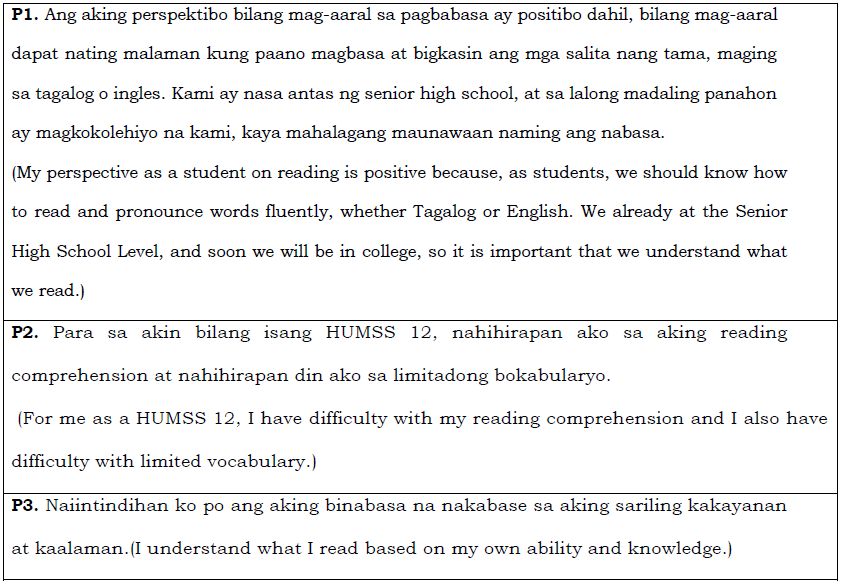
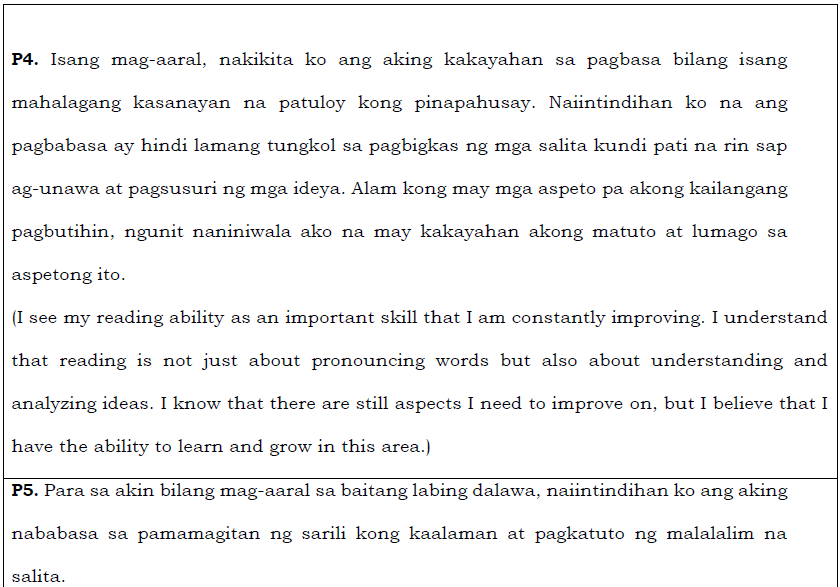

Interpretation in Table 1: All respondents’ answers focused on understanding literacy proficiency in reading among Grade 12 HUMSS students. Table 1 presents the perceptions of these students regarding their own literacy proficiency. One (1) respondent indicated difficulty due to a limited vocabulary. In contrast, four (4) respondents gave positive responses, attributing their reading proficiency to their knowledge and the habit of reading daily, which they believe enhances their reading comprehension. They also mentioned that, in preparation for college, they are making conscious efforts to further improve their literacy skills.
TABLE 2: Challenges do Grade 12 HUMSS Students facing in achieving Literacy Proficiency in Reading.
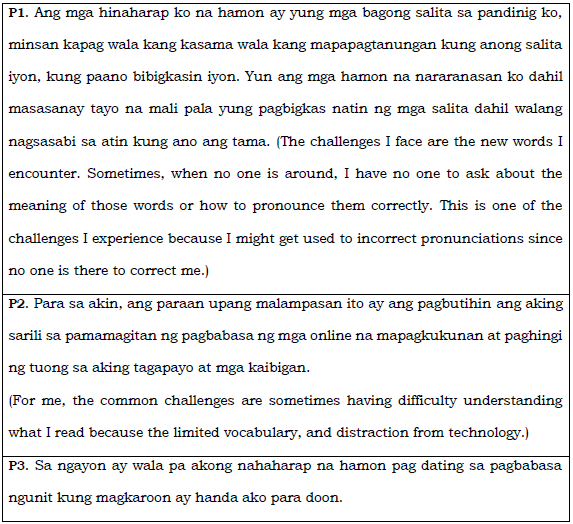
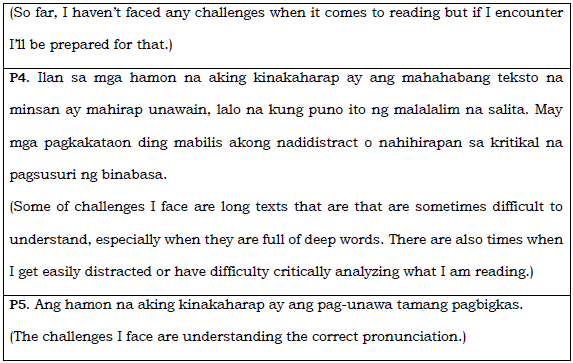
Interpretation for Table 2: All the respondents’ answers focused on understanding literacy proficiency in reading among Grade 12 HUMSS students. Table 2 presents how the respondents face challenges in achieving literacy proficiency. Four (4) of them reported difficulties in correctly understanding and pronouncing unfamiliar words. Although they are eager to improve, one of the main challenges they face is the lack of attention or support from others, which prevents them from asking questions. This often leads to misunderstandings or incorrect interpretations of what they read, as there is no one to correct them. Despite these challenges, they expressed a willingness to improve and help themselves through resources such as social media. Meanwhile, one (1) respondent stated that they have not encountered any challenges so far, but are prepared to face them if they arise.
TABLE 3: The Grade 12 HUMSS Students attempt to overcome the challenges with regards to their Literacy Proficiency in Reading.
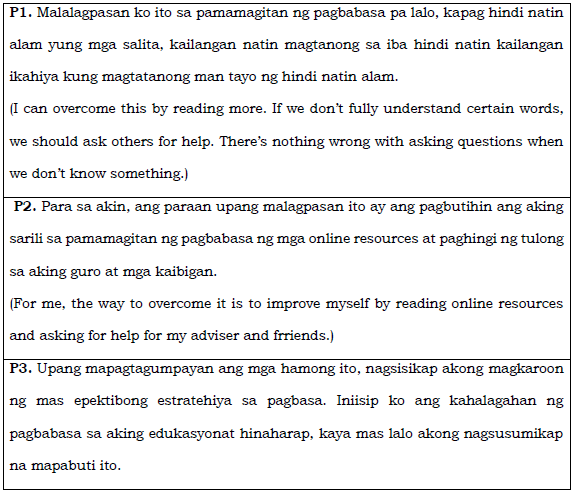
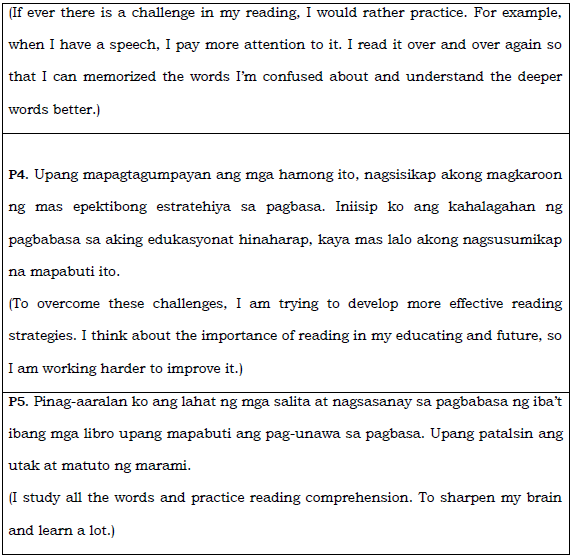
Interpretation for Table 3: All the respondents’ answers focused on understanding literacy proficiency in reading among Grade 12 HUMSS students. Table 3 illustrates the students’ attempts to overcome challenges related to their literacy proficiency through repeated reading and consistent practice. When faced with difficulties in understanding complex words or passages, they use strategies such as rereading texts multiple times to improve comprehension and fluency. This practice helps them become more familiar with challenging vocabulary, enhance their pronunciation, and build confidence in their reading abilities.
CHAPTER 5
SUMMARY OF FINDINGS, CONCLUSION, AND RECOMMENDATIONS
This chapter presents the summary, conclusions, and recommendationsof the study.
Summary of Findings
1. The study explored the perceptions of Grade 12 HUMSS students regarding their literacy proficiency in reading. Results from Table 1 indicate that most respondents had a positive view of their reading abilities. One (1) student reported difficulty due to limited vocabulary, while four others believed regular reading and preparation for college have helped improve their reading comprehension. Overall, the findings highlight varying levels of proficiency, with most students demonstrating a proactive attitude toward enhancing their literacy skills.
2. Four (4) respondents directly stated that the difficulties they face are unfamiliar words and a lack of sufficient vocabulary, while one (1) respondent reported not experiencing any difficulties with reading.
3. Three (3) respondents stated that they attempt to overcome challenges by practicing reading using their own strategies and skills to improve their literacy proficiency and reading comprehension. Meanwhile, two (2) respondents said they seek help from friends and teachers when encountering unfamiliar words.
Conclusions
- The findings of the study reveal that Grade 12 HUMSS students generally hold a positive perception of their literacy proficiency in reading. While some students face challenges, such as limited vocabulary, the majority are actively engaged in improving their skills through regular reading and preparation for college. This suggests a strong sense of self-awareness and motivation among the students to enhance their reading comprehension. Overall, the study underscores the importance of fostering supportive learning environments that encourage consistent reading habits and provide assistance to those facing literacy challenges.
- The results indicate that most Grade 12 HUMSS students face challenges in reading due to unfamiliar words and limited vocabulary. However, one student reported no difficulties, suggesting that reading proficiency levels vary among individuals. These findings highlight the need for targeted support in vocabulary development to help students overcome common reading challenges and improve overall literacy skills.
- The findings show that Grade 12 HUMSS students use different approaches to overcome challenges in reading. Most of respondents rely on their own strategies and consistent practice to enhance their literacy proficiency, and other respondents turn to external support by seeking help from friends and teachers when facing unfamiliar words. This suggests that both independent learning and collaborative support play important roles in improving reading comprehension among students.
Recommendations
For the preceding findings and conclusions, the following recommendations are offered by the researchers.
- To enhance comprehension and fluency, schools should implement organized reading programs and encourage students to engage with a variety of texts. Schools can establish reading clubs, organize reading challenges, or provide access to diverse reading materials that cater to different interests and reading levels.
- Schools should offer specific vocabulary development programs that focus on expanding students' word knowledge, especially for those who struggle with unfamiliar words. These programs could include activities like word maps, vocabulary quizzes, and contextual reading exercises. Also, encourage students to learn new words in context through reading diverse genres. Providing a wide variety of reading materials will help students see words used in different settings, improving retention and understanding.
- Give struggling readers Targeted Support to aid learners who are having trouble in reading, teachers should identify them and provide interventions like peer mentoring and guided reading sessions. Also, offer workshops that teach students effective strategies for reading comprehension, such as skimming, scanning, and making predictions. These workshops can empower students to become more independent in tackling difficult reading materials.
REFERENCES
Abbas Pourhosein (2019) Overcoming Literacy Challenges in Readinghttps://www.researchgate.net/profile/Abbas-Pourhosein-Gilakjani/publication/303742915_How_Can_Students_Improve_Their_Reading_Comprehension_Skill/links/5943ee9ba6fdccb93ab5a488/How-Can-Students-Improve-Their-Reading-Comprehension-Skill.pdf
Buyamin Celik et. Al (2020) Challenges faced by Students in Achieving Literacy Proficiency in Reading https://www.amazoniainvestiga.info/index.php/amazonia/article/view/2187
Bulger et, al (2019) Proficiency https://www.researchgate.net/publication/265296612_Knowledge_and_processes_that_predict_proficiency_in_digital_literacy
Evan Tarver, (2024) Socio-Economics https://www.investopedia.com/terms/s/social-economics.asp
Frankel et. al. (2016) Literacy https://www.researchgate.net/publication/311946786_From_What_is_Reading_to_What_is_Literacy
Kapil Verman (2023) Education https://www.researchgate.net/publication/372418302_Education_Meaning_definition_Types
Locke (2021) Fundamental of Reading https://www.merriam-webster.com/dictionary/fundamentalPrebisch (2019) Dependency https://www.britannica.com/topic/dependency-theory
Buyamin Celik et. Al (2020) Students Perception on Literacy Proficiencyhttps://www.amazoniainvestiga.info/index.php/amazonia/article/view/2187
Bulger et, al (2019) Proficiency https://www.researchgate.net/publication/265296612_Knowledge_and_processes_that_predict_proficiency_in_digital_literacy
Evan Tarver, March 08, 2024(Socio-Economics) https://www.investopedia.com/terms/s/social-economics.asp Frankel et. al. 2016(Literacy)https://www.researchgate.net/publication/311946786_From_What_is_Reading_to_What_is_Literacy
John Locke (2022) Fundamental of Reading https://www.merriam-webster.com/dictionary/fundamental
Kapil Verman( 2023) Education Definitionhttps://www.researchgate.net/publication/372418302_Education_Meaning_definition_Types
Leonardo Herrea (2019) Students attempt to overcome the challenges with regards to literacy Proficiency. https://scholar.google.com/scholar?hl=en&as_sdt=0%2C5&q=+student+attempt+to+overcome+the+challenges+with+regards+to+their+literacy+proficiency%3F+understanding+the+literacy+proficiency+&btnG=#d=gs_qabs&t=1738675236470&u=%23p%3D7DNIWvkfiFcJ
Matthew Lynch (2016) decision making processes https://www.theedadvocate.org/why-students-struggle-with-reading-comprehension
Mlachila (2015) Students attempt to overcome the challenges with regards to literacy Proficiency. https://scholar.google.com/scholar?q=the+student+attempt+to+overcome+the+challenges+wits+regards+to+their+literacy+proficiency+in+reading&btnG.x=33&btnG.y=16&hl=en&fbclid=IwZXh0bgNhZW0CMTEAAR1GzshBd1RYiVGw1Pfn-VQeiffOa5L1oa08sVPI2ESvDH4jH2mTIP5DdH0_aem_ocAuq9hfDykKZXPTDSdvbw#d=gs_qabs&t=1743001533040&u=%23p%3DOPkjYHVyrrgJ
Nina Parrish( 2015) Ways to support students who struggle reading comprehensionhttps://www.edutopia.org/article/5-ways-support-students-who-struggle-reading-comprehension
Raúl Prebisch (2011) Dependency https://www.britannica.com/topic/dependency-theory\
Woolley (2011) Reading Comprehension https://www.google.com/url?sa=t&source=web&rct=j&opi=89978449&url=https://www.researchgate.net/publication/302884206_Reading_Comprehension&ved=2ahUKEwjJvreXhqiMAxU_h1YBHWY1Fj4QFnoECAoQAQ&usg=AOvVaw2uyEXfTDclfGjx-jFW5tSU